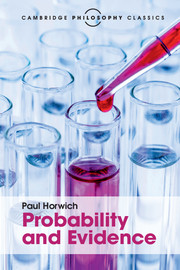Alexander, H. G. (1958). The paradoxes of confirmation, British Journal for the Philosophy of Science, 9, 227–33.
Ayer, A. J. (1972). Probability and evidence. Columbia University Press.
Black, M. (1958). Self-supporting inductive arguments, Journal of Philosophy, 55, 718–25.
Carnap, R. (1950). Logical foundations of probability. University of Chicago Press.
Carnap, R. & Jeffrey, R. (eds.) (1971). Studies in inductive logic and probability. University of California Press.
De Finetti, B. (1937). On the partial equivalence condition. Translated in Studies in inductive logic and probability, vol. 2, Jeffrey, R. (ed.). University of California Press, 1980.
De Finetti, B. (1937). Foresight: its logical laws, its subjective sources. Translated in Studies in subjective probability, Kyburg, H. E. & Smokler, H. E. (eds.). John Wiley, 1964.
Friedman, M. (1978). Truth and confirmation, Journal of Philosophy, 7, 361–82.
Giere, R. N. (1973). Objective single case probabilities and the foundations of statistics. In, Logic, methodology and philosophy of science, vol. 4, Proceedings of the 1971 International Congress, Bucharest, Suppes, P., Henkin, L., Joja, A. & Morrill, C. R. (eds.). North-Holland.
Glymour, C. (1980). Theory and evidence. Princeton University Press.
Good, I. J. (1960). The paradoxes of confirmation, British Journal for the Philosophy of Science, 11, 145–9; 12, 63–4.
Good, I. J. (1966). On the principle of total evidence, British Journal for the Philosophy of Science, 17, 319–21.
Goodman, N. (1955). Fact, fiction and forecast,. Bobbs Merrill, 1975.
Hacking, I. (1965). Logic of statistical inference. Cambridge University Press.
Hacking, I. (1975). The emergence of probability. Cambridge University Press.
Hempel, C. G. (1945). Studies in the logic of confirmation. Reprinted in Aspects of scientific explanation. Free Press, 1965.
Hempel, C. G. (1966). Philosophy of natural science. Prentice-Hall.
Horwich, P. G. (1982). Three forms of realism, Synthese.
Hosiasson-Lindenbaum, J. (1940). On confirmation, Journal of Symbolic Logic, 5, 133–68.
Hosiasson-Lindenbaum, J. (1931). Why do we prefer probabilities relative to many data?, Mind, 40, 23–36.
Jeffrey, R. C. (1982). De Finetti's probabilism.
Keynes, J. M. (1921). Treatise on probability. Macmillan.
Kuhn, T. S. (1962). The structure of scientific revolutions. University of Chicago Press.
Kyburg, H. E. & Smokler, H. E. (eds.) (1964). Studies in subjective probability. John Wiley.
Kyburg, H. E. (1970). Probability and inductive logic. Macmillan.
Lewis, D. (1971). Immodest inductive methods, Philosophy of Science, 38, 54–63.
Lewis, D. (1973). Spielman and Lewis on inductive immodesty, Philosophy of Science, 40, 84–5.
Mackie, J. L. (1963). The paradox of confirmation, British Journal for the Philosophy of Science, 13, 265–77.
Mellor, D. H. (1971). The matter of chance. Cambridge University Press.
Popper, K. R. (1959). The logic of scientific discovery. Hutchinson.
Popper, K. R. (1962). Conjectures and refutations. Basic Books.
Popper, K. R. (1972). Objective knowledge. Oxford University Press.
Putnam, H. (1962). Degree of confirmation and inductive logic. Reprinted in Mathematics, matter and method, philosophical papers, vol. 1. Cambridge University Press, 1975.
Putnam, H. (1978). Meaning and the moral sciences. Routledge & Kegan Paul.
Ramsey, F. P. (1926). Truth and probability. Included in Foundations, essay by Ramsey, F. P., Mellor, D. H. (ed.). Routledge & Kegan Paul, 1978.
Rosenkrantz, R. (1977). Inference, method and decision. Reidel.
Russell, B. (1912). Problems of philosophy.
Skyrms, B. (1975). Choice and chance. Dickinson.
Spielman, S. (1972). Lewis on immodest inductive methods, Philosophy of Science, 39, 375–7.
Strawson, P. F. (1952). Introduction to logical theory. John Wiley.
Suppes, P. (1966). A Bayesian approach to the paradoxes of confirmation. In Aspects of inductive logic, 199–207, Hintikka, J. & Suppes, P. (eds.). North-Holland.
Swinburne, R. G. (1971). The paradoxes of confirmation - a survey, American Philosophical Quarterly, 8, 318–29.
von Neumann, J. & Morgenstern, O. (1944). Theory of games and economic behavior,. Princeton University Press. (2nd edn. John Wiley, 1964.)



